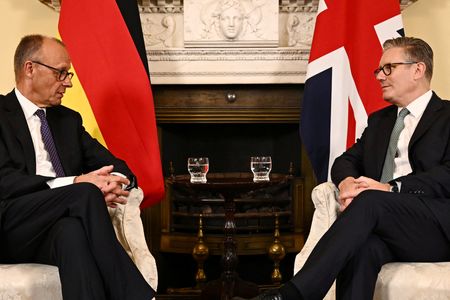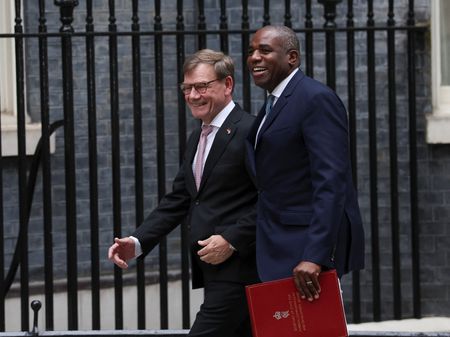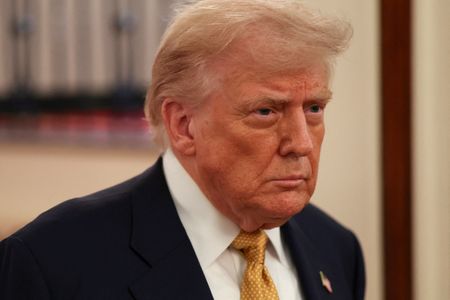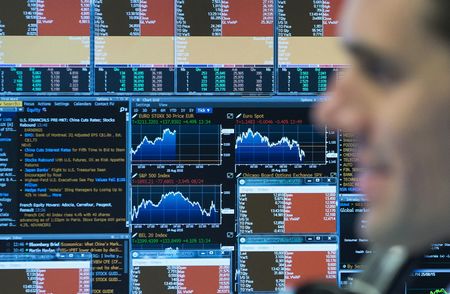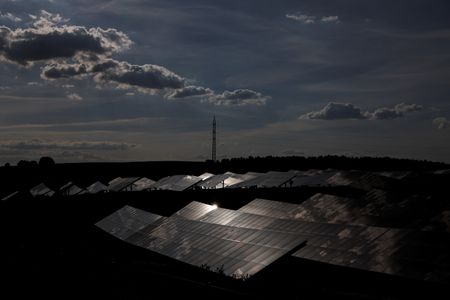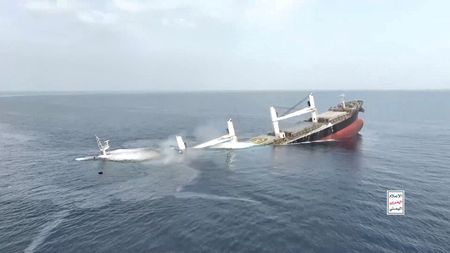By Sarah Marsh and Elizabeth Piper
STEVENAGE, England (Reuters) -Prime Minister Keir Starmer and German Chancellor Friedrich Merz hailed a major treaty to deepen ties in areas ranging from defence to immigration on Thursday, the latest step in Britain’s push to reset UK relations with the European Union.
On his first trip to London as chancellor, Merz described the Kensington treaty as historic, the first major bilateral agreement between Britain and Germany to deepen defence cooperation and to try to boost economic growth in both nations.
Merz’s day trip follows a three-day state visit to Britain by French President Emmanuel Macron, signalling greater cooperation between Europe’s top three powers at a time of threats to the continent and uncertainty about their U.S. ally.
“We see the scale of the challenges our continent faces today, and we intend to meet them head on,” Starmer told a press conference after the two leaders signed the treaty in the Victoria and Albert Museum, co-founded by Britain’s Queen Victoria and her husband Prince Albert, of German origin.
“The Kensington treaty … is an expression of our shared aims and values. But more than that, it’s a practical work plan setting out 17 major projects where we will come together to deliver real results which will improve people’s lives.”
Standing next to Starmer at an Airbus plant, Merz again lamented Britain’s departure from the EU, but said the agreement would cement ties between the two nations and complement an agreement London struck with France.
“We are jointly determined to shape this new era with new leadership opportunities – the United Kingdom and Germany side by side,” Merz said.
Europe has been confronted with new U.S. tariffs since President Donald Trump returned to the White House as well as questions about the U.S. commitment to defend its European allies, including Ukraine against Russia’s invasion.
WEAPONS FOR UKRAINE
The two leaders said they had discussed in detail plans to send more weaponry to Ukraine after Trump signalled he would sell weapons to NATO countries, including Patriot air defence missiles Kyiv has urgently sought.
Merz said the two had discussed Ukraine’s need for long-range strike systems, which he called “long range fire”. “And Ukraine will soon receive substantial additional support in this area,” he told the press conference.
The treaty includes a clause on mutual assistance which, “in light of the Russian war of aggression against Ukraine, is highly significant”, a German official said this week.
It builds on a defence deal agreed last year that included the joint development of long-range strike weapons, and comes after France and Britain agreed last week to reinforce cooperation over their respective nuclear arsenals.
As part of Thursday’s announcement, Britain and Germany also pledged to “pursue joint export campaigns” to drum up orders from other countries for equipment they make jointly, such as the Typhoon Eurofighter jet and the Boxer armoured vehicle.
That could help boost sales, and represents a significant reversal from the previous 10 years, when Germany blocked Saudi Arabia and Turkey from buying Typhoons.
Beyond defence, the treaty also includes an agreement to develop a new direct rail link between the two countries, to allow frequent travellers access to e-gates at German airports and to support youth mobility between the two nations.
In a win for Starmer, they also pledged to jointly combat irregular migration.
Germany pledged to outlaw the facilitation of illegal migration to Britain, with a law change by the end of the year.
That would give law enforcement the tools to investigate warehouses and storage facilities used by migrant smugglers to conceal dangerous small boats intended for illegal crossings to Britain.
(Reporting by Sarah Marsh and Elizabeth Piper; Additional reporting by Andreas Rinke and Sarah Young; Editing by Ros Russell and Alison Williams)

